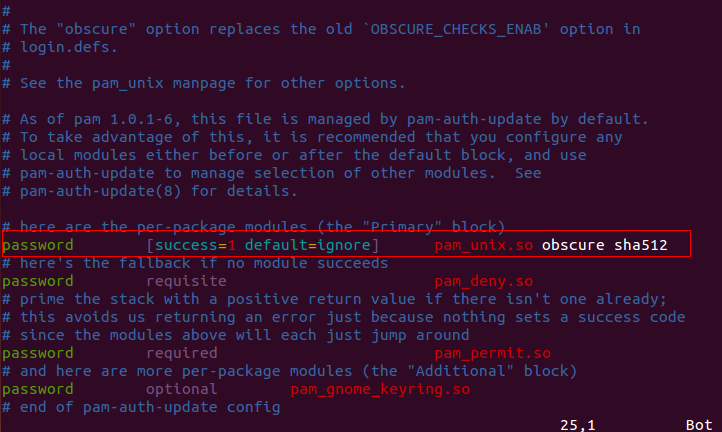怎么设置Linux密码策略
这篇文章介绍怎么限制密码使用的长度、复杂度,过期时间。目的是防止用户使用弱密码,强制用户设置强密码。
Linux的用户密码是一大安全因素。如果你使用弱密码,极有可能会被人暴力破解。很多系统的安全问题都是由于使用弱密码引起的。
做为系统管理员,你应使用复杂的强密码。
设置密码长度
默认安装下,所有基于Linux操作系统,要求用户密码至少使用6个字符。我建议密码至少不少于8位。一个强密码还需要混合大小写字母、数字和特殊字符。
基于Debian的系统(Debian Ubuntu Linux Mint)
基于Debian的系统一般把密码验证相关的配置文件放在/etc/pam.d/。
设置最少密码长度限制:至少8个字符。编辑 /etc/pam.d/common-password 文件:
$ sudo vim /etc/pam.d/common-password找到如下一行:
password [success=1 default=ignore] pam_unix.so obscure sha512

在上一行后添加 minlen=8,这里我设置密码长度至少8个字符。
password [success=1 default=ignore] pam_unix.so obscure sha512 minlen=8
保存退出。OK,现在用户不能设置少于8个字符的密码。
测试:

如果提供的密码不足8位,密码将设置失败。提示信息:You must choose a longer password(你可以试试自定义提示信息)。
基于RHEL的系统(RHEL CentOS Scientific)
RHEL7,CentOS7,Scientific7
执行如下命令设置密码长度,我设置8位:
# authconfig --passminlen=8 --update查看最少密码位数:
# grep "^minlen" /etc/security/pwquality.conf输入如下:
minlen = 8
RHEL6,CentOS6,Scientific6
编辑 /etc/pam.d/system-auth 文件:
# vim /etc/pam.d/system-auth修改一行如下,添加minlen=8:
password requisite pam_cracklib.so try_first_pass retry=3 type= minlen=8
设置密码复杂度
强制用户密码使用更多的字符集-大写字母、小写字母、数字和特殊字符。
基于Debian的系统(Debian Ubuntu Linux Mint)
首先安装密码复杂度检查工具库 libpam-pwquality:
$ sudo apt-get install libpam-pwquality编辑 /etc/pam.d/common-password 文件:
$ sudo vim /etc/pam.d/common-password安装完上面的库,这个配置文件自动添加了一行:
password requisite pam_pwquality.so retry=3
我们需要使用pam_pwquality来设置密码复杂度。

如果你要求密码至少需要有一个大写字母,在上面一行后添加 ucredit=-1:
password requisite pam_pwquality.so retry=3 ucredit=-1
要求密码至少需要有一个小写字母:
password requisite pam_pwquality.so retry=3 lcredit=-1
要求密码至少需要有一个数字:
password requisite pam_pwquality.so retry=3 dcredit=-1
要求密码至少需要一个除字母数字以外的其他字符:
password requisite pam_pwquality.so retry=3 ocredit=-1
你也可以设置密码最少包含的字符集(minclass):
password requisite pam_pwquality.so retry=3 minclass=2
你可以自由组合:
password requisite pam_pwquality.so retry=3 dcredit=-1 ucredit=-1 lcredit=-1 ocredit=-1
基于RHEL的系统(RHEL CentOS Scientific)
RHEL7,CentOS7,Scientific7
设置密码中至少包含一个小写字符,执行命令:
# authconfig --enablereqlower --update查看设置:
# grep "^lcredit" /etc/security/pwquality.conf设置密码中至少包含一个大写字符,执行命令:
# authconfig --enablerequpper --update查看设置:
# grep "^ucredit" /etc/security/pwquality.conf设置密码中至少包含一个数字字符,执行命令:
# authconfig --enablereqdigit --update查看设置:
# grep "^dcredit" /etc/security/pwquality.conf设置密码中至少包含一个特殊字符,执行命令:
# authconfig --enablereqother --update查看设置:
# grep "^ocredit" /etc/security/pwquality.confRHEL6,CentOS6,Scientific6
编辑 /etc/pam.d/system-auth 文件:
# vim /etc/pam.d/system-auth找到如下一行,修改:
password requisite pam_cracklib.so try_first_pass retry=3 type= minlen=8 dcredit=-1 ucredit=-1 lcredit=-1 ocredit=-1
上面配置了密码至少8个字符长,并且分别包含大小写字母、数字和特殊字符。
设置密码过期时间
我们设置如下策略:
- 一个密码使用的最长天数
- 更改密码最少天数间隔,为了不让用户频繁更改密码
- 在密码过期前多少天提醒用户
基于Debian的系统(Debian Ubuntu Linux Mint)
编辑文件 login.defs:
$ sudo vim /etc/login.defs分别设置如下参数:
PASS_MAX_DAYS 100
PASS_MIN_DAYS 0
PASS_WARN_AGE 7

上面的例子,强制用户每100天更改一次密码,提前7天提醒用户。
注意,上面的配置只对系统中的新建用户生效。如果你要指定某个以存在的用户可以使用如下命令:
$ sudo chage -M <days> <username>
$ sudo chage -m <days> <username>
$ sudo chage -W <days> <username>使用 chage -l username 命令显示用户密码信息,例:

你会发现Password inactive和Account expires并没有生效,执行如下命令:
$ sudo chage -E 24/09/2016 -m 0 -M 90 -I 10 -W 7 bibi
用户在密码过期10天后锁定。
基于RHEL的系统(RHEL CentOS Scientific)
和Debian系统一样。
防止用户再次使用以前使用过的密码
一般来说,不建议用户再次使用同一个密码。
基于Debian的系统(Debian Ubuntu Linux Mint)
编辑 /etc/pam.d/common-password:
$ sudo vim /etc/pam.d/common-password在下面一行后添加 remember=10:
password [success=1 default=ignore] pam_unix.so obscure use_authtok try_first_pass sha512 remember=10
上面设置了不允许再次使用最近的10个密码。
基于RHEL的系统(RHEL CentOS Scientific)
编辑 /etc/pam.d/system-auth:
# vim /etc/pam.d/system-auth在下面一行后添加 remember=10:
password sufficient pam_unix.so sha512 shadow nullok try_first_pass use_authtok remember=10
The End~